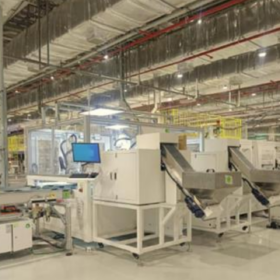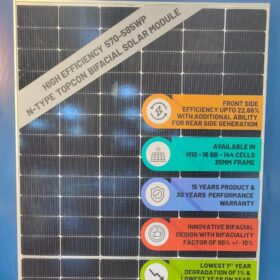In a significant partnership with the Green Hydrogen Organisation (GH2) and Nile University, the International Solar Alliance (ISA) launched a five-day training to equip officials from 14 countries with crucial green hydrogen policy expertise.
The Green Hydrogen Innovation Centre (GHIC), ISA’s specialised offering under the green hydrogen ambit, functions as a dynamic hub, providing extensive information on the green hydrogen sector. In partnership with the Ministry of New and Renewable Energy, Government of India and the Asian Development Bank, ISA envisions the GHIC spearheading innovation and propelling the green hydrogen landscape towards a sustainable future.
The inaugural training workshop welcomed distinguished leaders, including H.E. Eng. Sabah Mashaly, Deputy Minister of Electricity and Renewable Energy, Egypt; Dr Mahmoud Mohieldin, United Nations Special Envoy for Financing the 2030 Sustainable Development Agenda; Dr Wael Akl, President of Nile University; Lord Adair Turner, Chairman, Energy Transitions Commission; Mr Jonas Moberg, CEO of GH2; and a delegation from ISA led by Mr Ramesh Kumar Kuruppath, Chief of Unit, Programme & Projects Implementation.
The five-day training course, from August 18 to 23, 2024, was a unique opportunity designed to equip government officials with cutting-edge expertise in renewable energy, green hydrogen production, applications, and policy development. Participants engaged in comprehensive sessions covering various aspects of technology, finance, standards, trade, infrastructure, and strategy – including guarantee instruments for green hydrogen, all tailored to foster a deep understanding of green hydrogen’s role in the global energy transition.
Expressing his satisfaction with the turnout, Ramesh Kumar Kuruppath, Chief of Unit, Programme & Projects Implementation at ISA, noted, “Thirteen ISA Member Countries, including ten African nations and three countries from the Latin American and Caribbean region, actively participated in the workshop, demonstrating a global commitment to advancing green hydrogen technologies and policies. Mauritania’s participation as a special invitee has further enriched the international dialogue.” Expressing appreciation for the partners, he said, “The collaboration with GH2 and Nile University reflects a shared vision of empowering nations with the knowledge and tools necessary to lead in the adoption of green hydrogen technologies and policies.”
Sharing his experience, Kyeyune Noah, Energy Officer from the Renewable Energy Department, Ministry of Energy and Mineral Development, Uganda, said, “As a government official from the Ministry of Energy and Mineral Development of Uganda, this green hydrogen Policy Accelerator training has been incredibly valuable! I have gained a deeper understanding of green hydrogen technology and its potential to transform our energy landscape. Particularly, the training has provided critical insights into effective policy frameworks, enabling me to better support developing and implementing green hydrogen initiatives in Uganda. I am now better equipped to foster collaboration, drive innovation, and advance our national green hydrogen strategy to ensure a more sustainable and resilient energy sector for Uganda.”
A participant from Mauritius, Deeresh Bekaroo, Acting Lead Engineer, Ministry of Energy and Public Utilities, expressed, “I sincerely thank the International Solar Alliance and the Green Hydrogen Organisation for the opportunity to participate in this outstanding training course. The skills and knowledge I have acquired about green hydrogen, the game changer in decarbonising various economic sectors, will surely be valuable in my professional work.”
Participants from the Ministry of Environment of Panama, Juan Lucero, Decarbonisation Coordinator and Gabriela Santamaria, the National Emissions Management Programme Coordinator, shared, “Panama appreciates the initiative of the International Solar Alliance, the Green Hydrogen Organisation and the Nile University for organising and hosting such a relevant event, which allow developing countries to share experiences and acquire knowledge to move forward solid and effective policies to promote the development of green hydrogen and to identify opportunities of improvement to achieve national and regional goals of development and decarbonisation in Central America.”
This initiative underscores ISA’s unwavering commitment to advancing the clean energy agenda, particularly in regions where renewable energy development is crucial for sustainable growth.
Nile University (NU) is a leading, innovative university in Egypt, recognised as the top entrepreneurial university in Africa. As a national, research-focused institution, NU excels in the key areas of Learning, Research, Innovation and Entrepreneurship, and Community Impact. Our rapid growth and use of advanced technologies in various fields earned us international recognition. NU’s cutting-edge incubators, top-notch labs, and facilities are vital in advancing knowledge and economic growth in the country.
About the Green Hydrogen Organisation (GH2)
The Green Hydrogen Organisation (GH2) is an international non-profit organisation dedicated to accelerating the production and use of green hydrogen. GH2 works with governments, industry, and civil society to develop green hydrogen policies, standards, and projects contributing to a sustainable and resilient global energy system.
About the International Solar Alliance
The International Solar Alliance is an international organisation with 119 Member and Signatory countries. It works with governments to improve energy access and security worldwide and promote solar power as a sustainable transition to a carbon-neutral future. ISA’s mission is to unlock US$ 1 trillion of investments in solar by 2030 while reducing the cost of the technology and its financing. It promotes the use of solar energy in the Agriculture, Health, Transport and Power Generation sectors. ISA Member Countries are driving change by enacting policies and regulations, sharing best practices, agreeing on common standards, and mobilising investments. Through this work, ISA has identified, designed and tested new business models for solar projects; supported governments to make their energy legislation and policies solar-friendly through Ease of Doing Solar analytics and advisory; pooled demand for solar technology from different countries; and drove down costs; improved access to finance by reducing the risks and making the sector more attractive to private investment; increased access to solar training, data and insights for solar engineers and energy policymakers. With the signing and ratification of the ISA Framework Agreement by 15 countries on 6 December 2017, ISA became the first international intergovernmental organisation to be headquartered in India. ISA is partnering with multilateral development banks (MDBs), development financial institutions (DFIs), private and public sector organisations, civil society, and other international institutions to deploy cost-effective and transformational solutions through solar energy, especially in the least Developed Countries (LDCs) and the Small Island Developing States (SIDS).





